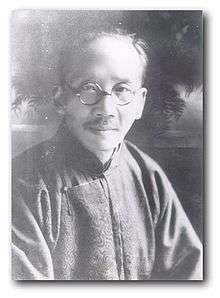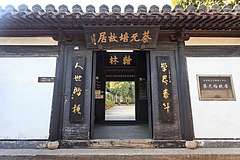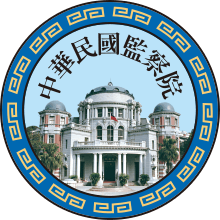Cai Yuanpei
Cai Yuanpei (Chinese: 蔡元培; pinyin: Cài Yuánpéi; 11 January 1868 – 5 March 1940) was a Chinese philosopher and politician. He was the president of Peking University, and founder of the Academia Sinica. He was known for his critical evaluation of Chinese culture and synthesis of Chinese and Western thinking, including anarchism. At Peking University he assembled influential figures in the New Culture and May Fourth Movements.
Cai Yuanpei | |
|---|---|
蔡元培 | |
 | |
| President of the Control Yuan | |
| In office 1928 — 1929 | |
| Preceded by | Position created |
| Succeeded by | Zhao Daiwen |
| Personal details | |
| Born | 11 January 1868 Shaoxing, Zhejiang Province, China |
| Died | 5 March 1940 (aged 72) British Hong Kong |
| Spouse(s) | Wang Zhao (1889-1900, her death) Huang Zhongyu (1902.01.01-?, her death) Zhou Jun (1923.07.10-1940.03.05) |
| Children | 7 (including Cai Weilian) |
| Parents | Cai Guang (father) |
| Alma mater | Universität Leipzig |
| Occupation | Philossopher and Politician |
| Cai Yuanpei | |||||||||||||
|---|---|---|---|---|---|---|---|---|---|---|---|---|---|
| Traditional Chinese | 蔡元培 | ||||||||||||
| |||||||||||||
| Courtesy name | |||||||||||||
| Traditional Chinese | 鶴卿 | ||||||||||||
| Simplified Chinese | 鹤卿 | ||||||||||||
| |||||||||||||
| Second alternative Chinese name | |||||||||||||
| Chinese | 孑民 | ||||||||||||
| Literal meaning | "Lone Citizen" | ||||||||||||
| |||||||||||||
Biography

Born in Shānyīn County, Shaoxing prefecture, Zhejiang, Cai was appointed to the Hanlin Imperial Academy at 26. In 1898, he became involved in administering institutes and became:
- Superintendent of Shaoxing Chinese-Western School (紹興中西學堂監督)
- Head of Sheng District Shanshan College (嵊縣剡山書院院長)
- Director-Teacher of the Special Class (特班總敎習) of Nanyang Public School (predecessor of Shanghai Jiao Tong University)
He established Guangfuhui in 1904 and joined Tongmenghui in Paris the next year, and became a member of the Chinese anarchist group led by Wu Zhihui, and Li Shizeng. After studying philosophy, psychology, and art history in the Universität Leipzig of Germany in 1907 under Karl Lamprecht and Wilhelm Wundt,[1] he served as the provisional Republic's Minister of Education in January 1912, but later resigned during Yuan Shikai's presidency. Subsequently, he returned to Germany, and then went to France.
Cai returned to China in 1916 and served as the President of Peking University the following year. There he resumed his support, begun in his Paris years with Li Shizeng, for the Diligent Work-Frugal Study Movement, which sent worker-students to France. It was during his tenure at Peking University that he recruited such famous thinkers (and future Chinese Communist Party leaders) to the school as Chen Duxiu and Li Dazhao, as well as quite different thinkers as Hu Shih, a close friend, Liang Shuming and the painter Xu Beihong.[2]
In 1919, after the student leaders of the May Fourth demonstrators were jailed, Cai resigned in protest (returning to office in September). Meanwhile, he and Xu Beihong wrote regularly for the Daily University of Peking University that dealt with broader issues than just campus politics. Xu addressed issues of Art and Art History and in 1920 a university art journal called Painting Miscellany was published.[2] After resigning again in 1922, he spent a period of withdrawal in France. Returning in 1926, he supported his fellow-provincial Chiang Kai-shek and the Kuomintang's efforts to unite the country. Along with Wu Zhihui, Li Shizeng, and Zhang Renjie, he was known as one of the "Four Elders" of the Party, and a staunch anti-communist. He was appointed president of the Control Yuan, but soon resigned.[3]
Cai was frustrated in his efforts to remodel the national system of education to resemble the French system, but in 1927, he co-founded the National College of Music, which later became the Shanghai Conservatory of Music, and in April 1928, he helped to found and became the first president of the Academia Sinica. He and a wide circle of colleagues founded the China League for Civil Rights which criticized the national government and Chiang Kai-shek for abuse of power. The situation worsened, however; the League could not attain the release from jail of Chen Duxiu, Cai's former dean at Peking University, for instance. In June 1933, the Academia Sinica's academic administrator and co-founder of the League, Yang Quan, was shot and killed in the street in front of the League's Shanghai offices. After a period of shock and reflection, Cai retired from public view in a statement denouncing the political repression of the Nanjing government.[4]
After the outbreak of the Second Sino-Japanese War in 1937, partly because of declining health, instead of accompanying the national government to Sichuan, Cai moved to Hong Kong. He lived there in seclusion until his death in March 1940 at the age of 72.[5]
Thought
Cai advocated the equal importance of five ways of life — "Virtue, Wisdom, Health, Collective, and Beauty" (德、智、體、群、美) — core values that are still taught in schools today in Taiwan, Hong Kong, and Macau. He was also a proponent of women's right to divorce and remarry, and strongly opposed foot binding and concubinage that were widely practiced in China at the time.
Bibliography
- Cai Jianguo (1998). Cai Yuanpei: Gelehrter und Mittler zwischen Ost und West (in German). Translated by Stichler, Hans Christian. Münster [u.a.]
- Wang Peili (1996). Wilhelm von Humboldt und Cai Yuanpei: eine vergleichende Analyse zweier klassischer Bildungskonzepte in der deutschen Aufklärung und in der ersten chinesischen Republik (in German). Münster, New York: Waxmann.
- "Ts'ai Yuan-p'ei," in Howard L. Boorman, ed., Biographical Dictionary of Republican China Volume 3 (New York: Columbia University Press, 1967; ISBN 0231089570) pp. 295– 299.
- Timothy B. Weston. The Power of Position: Beijing University, Intellectuals, and Chinese Political Culture, 1898-1929. (Berkeley: University of California Press, 2004; ISBN 0520237676).
See also
References
- Gao Zhipeng The Emergence of Modern Psychology in China, 1876 – 1922 Archived 2013-11-07 at the Wayback Machine; Jing Qicheng and Fu Xiaolan Modern Chinese psychology: Its indigenous roots and international influences Archived 2014-07-27 at the Wayback Machine. International Journal of Psychology, 36(6), 2001, 408. doi:10.1080/00207590143000234
- Brown, edited by Rebecca M.; Hutton, Deborah S. (2011). A Companion to Asian Art and Architecture. Chicester: Wiley. p. 553. ISBN 1444396323.CS1 maint: extra text: authors list (link)
- Boorman, Biographical Dictionary, Vol III, pp. 297-298.
- Boorman, Biographical Dictionary, Vol III, p. 298.
- Boorman, Biographical Dictionary, Vol III, p. 299.
External links
les jean Jacques Rousseau en Chine:Cai Yuan Pei et John Dewey (ISBN 1493536001) CreateSpace Independent Publishing Platform (24 Sept. 2012)
| Wikimedia Commons has media related to Cai Yuanpei. |
- Tsai Yuan-pei (Cai Yuanpei) 蔡元培 from Biographies of Prominent Chinese c.1925.
Portrait
- Cai Yuanpei. A Portrait by Kong Kai Ming at Portrait Gallery of Chinese Writers (Hong Kong Baptist University Library).
| Government offices | ||
|---|---|---|
| Preceded by Position created |
President of Control Yuan 1928—1929 |
Succeeded by Zhao Daiwen |
